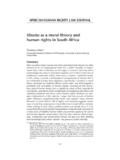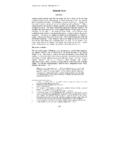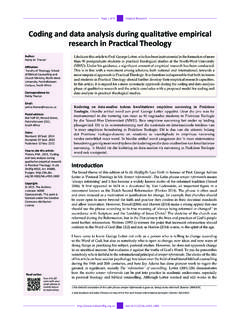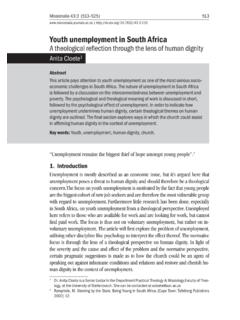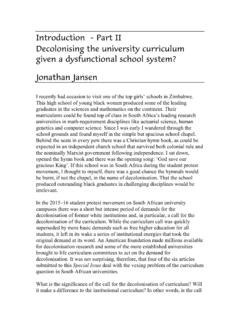Transcription of Die onderneming in die gemeenskap: Korporatiewe ...
1 731 Tydskrif vir Geesteswetenskappe, Jaargang 54 No. 4: Desember 2014 Navorsings- en oorsigartikels / Research and review articles (2)Die onderneming in die gemeenskap : Korporatiewe maatskaplike betrokkenheid deur Sanlam, 1918 1980 The enterprise in the society: Corporate social engagement by Sanlam, 1918 1980 Grietjie VerhoefDepartement RekeningkundeUniversiteit van VerhoefGrietjie Verhoef is die Direkteur van die Suid-Afrikaanse Sentrum vir Rekeningkunde Geskie-denis in die Departement Rekeningkunde aan die Universiteit van Johannesburg. Haar navorsing handel oor Sake- en Ekonomiese Geskiedenis van Suid-Afrika, asook die ontwikkeling van die rekeningkundige professie in Suid-Afrika. Sy het hoofstukke bygedra tot twaalf boeke en 57 geakkrediteerde artikels gepubliseer. Haar voort-gesette navorsingsprojekte handel oor die ont-wikkeling van entrepreneurskap in Suid-Afrika en Afrika, die rekeningkundige professie en entre-preneurskap, die versekeringsbedryf en groot besigheidsgroepe in Suid-Afrika.
2 Sy is tans die President van die Internasionale Ekonomiese Geskiedenis Verhoef is Director of the South African Centre for Accountancy History in die Department of Accountancy at the University of Johannesburg. Her research focuses on the Business and Economic History of South-Africa, as well as the development of the accountancy profession in South Africa. She contributed chapters to twelve books and has published 57 articles in accredited journals. Her ongoing research projects deal with the development of entrepreneurial ability in South Africa and Africa, the accountancy profession and entrepreneurial ability, the insurance industry and big business in South Africa. She is currently President of the International Economic History enterprise in the society: Corporate social engagement by Sanlam, 1918 1980 Corporate social responsibility, broadly understood to be the conduct of enterprises to contribute to sustainable economic development in conjunction with employees, families, the community as well as the broader society to improve the quality of life of all, has become statutory responsibility manipulated by various stakeholders to serve different purposes in the social and business contexts.
3 The concept of corporate social responsibility CSR acquired prominence and value for enterprises, especially big business and transnational conglomerates that needed to address legitimacy concerns in the markets in which they operated. Animosity between business and society developed as a result of business conduct exploiting resources in the host markets, exploitation of human resources as well as attempts to manipulate governments to gain preferential treatment. The drive to sustain 732 Tydskrif vir Geesteswetenskappe, Jaargang 54 No. 4: Desember 2014the value extraction within tight time schedules in order to deliver commodities as contracted, from markets in the southern hemisphere to northern hemisphere business, led to labour practices and business conduct which aroused protest and opposition in the exploited markets.
4 International human rights organisations gradually responded by labelling business contravening best practice publically as exploitative and not doing business in good faith. Global activism against business exploitation led to the formulation of principles of good conduct, which fed into more formal programmes of responsible business conduct. The early post-industrialisation history in Britain has witnessed benevolent actions by well-intended businessmen to alleviate the plight of poor labour, or the poor in the industrialised urban society. These actions were primarily philanthropic, but were later supplemented by entrepreneurial activity to conduct better business .This paper recognises the long history of responsible conduct by business with respect to the needs of the broader society, but it presents a case study of a life assurer in South Africa, Sanlam.
5 Sanlam was not forced by any statute to engage constructively with the broader society, but implemented a policy of corporate social engagement since its formation. Sanlam s vision and commitment to policyholders best interests, to the education of people whereby they would be empowered to take responsibility for their own lives, was the overarching purpose of the company. It was argued that empowerment of the people is the only method of creating real benefits to the entire South African society (which meant everybody living in South Africa), which was the ultimate goal of the life assurer. Sanlam implemented corporate social engagement to empower its policyholders, to enable them to make a substantial contribution to the South African economy and thereby to the benefit of all South Africans.
6 This paper explores the Sanlam corporate social engagement programmes from 1918 to 1980 to illustrate the successful implementation of CSR long before CSR became a political tool. It is argued that when CSR is voluntary and linked directly to stakeholders, such programmes serve to build successful CSR and create real benefit to the recipients as well as the broader society. A historical analysis is made of the rationale of Sanlam management in implementing programmes to facilitate empowerment of policyholders, the education of needy children as well as bursary schemes for university study. These actions were supplemented by programmes to enable schools to build hostels for school children. Sanlam provided credit to people in need of credit, but who would not qualify for credit at ordinary bank institutions, as well as mortgages on agricultural land as a means of empowering its policyholders.
7 Sanlam advocated its role as mutual assurer to provide security to its policyholders. Therefore Sanlam offered access to credit, or a postponement of the payment of policy premiums in case of temporary inability to pay, since thereby the company was seen to practise what it preached: security through life assurance to the people and then through them being secure, greater stability to the South African society and economic progress for everybody living in the country in the long run. Sanlam set out to build local ownership of the economy. Life assurance thus provided a savings mechanism and simultaneously an ability to grow financial independence, thereby beating white poverty which had taken on crisis proportions during the late 1920s and 1930s. Real economic empowerment lay in self-empowerment, facilitated by responsible corporate social engagement by the Sanlam Management.
8 The corporate social engagement programmes of Sanlam before 1980 was directed at its own policyholders, but the profile of that constituency always included non-Afrikaners as well. This paper explores the non-statutory real social engagement programmes of Sanlam aimed at real empowerment and not politically sanctioned action to serve biased political interests. KEYWORDS: society, policyholders, social responsibility, growth, insurance companyTREFWOORDE: gemeenskap , polishouers, maatskaplike verantwoordelikheid, groei, versekeringsmaatskappy733 Tydskrif vir Geesteswetenskappe, Jaargang 54 No. 4: Desember 2014 OPSOMMINGK orporatiewe sosiale verantwoordelikheid het n statut re verpligting geword wat deur verskeie belanghebbende partye gebruik word om uiteenlopende oogmerke te verwesenlik. Die konsep Korporatiewe sosiale verantwoordelikheid (corporate social responsibility (CSR) het eers gedurende die 1990s prominensie in die Korporatiewe omgewing begin kry, hoewel die konsep van ondernemings se sosiale verantwoordelikheid teenoor die bre r gemeenskap ingrypend deur die geskiedenis verander het.)
9 Hoe behoort ondernemings se sosiale betrokkeheid beslag te kry? Watter rasionaal behoort daardie optrede te motiveer? Hierdie artikel ondersoek die inherente dryfvere in Sanlam vir sosiale betrokkenheid teen die agtergrond van die teorie van Korporatiewe sosiale verantwoordelikheid. Hierdie artikel wys op die eiesoortige geaardheid van maatskaplike betrokkenheid deur Sanlam as n langtermynversekeringsmaatskappy in Suid-Afrika. Dit dui op n bydrae tot die teoretiese diskoers oor Korporatiewe sosiale verantwoordelikheid aan die hand van die geskiedenis van Korporatiewe maatskaplike betrokkenheid in 1961 het Mnr W J Bezuidenhout,1 Algemene Bestuurder van Sanlam, die onderneming beskryf as n bron van inspirasie vir hom omdat ..ons hier te doen het met n beweging gemik op die verwesenliking van n grootse ideaal wat reeds 42 jaar aan die gang is en waaraan groot getalle volksgenote reeds getroue diens gelewer het.
10 Daar is 42 jaar gelede bewustelik n groot taak (dit was) juis hierdie bewustheid van sy taak die opheffing van ons eie mense n taak wat steeds groter word namate ons Land vooruitgaan en ons Volk al meer n verstedelikte volk word ..Dit is hierdie roepingsbewustheid waarin die verskil tussen Sanlam en ander versekeringsmaatskappye l . Sodra ek gehelp word om tot hierdie diepere wese van Sanlam deur te dring en my met sy roeping te vereenselwig dan vind ek dat Sanlam as maatskappy vir my n besieling word. (SA 6/5/1: Bezuidenhout,1961)Die oprigting van ondernemings word normaalweg gemotiveer deur die winsmotief en daarsonder sal geen onderneming die toets van die tyd deurstaan nie. Die versterking van die bestaansreg van die onderneming deur bre r samelewingsanksionering verhoog die lewensvatbaar heid en volhoubaarheid van die onderneming .
